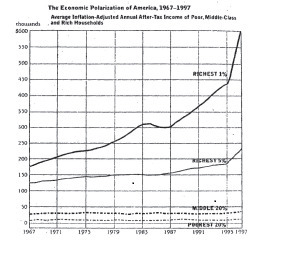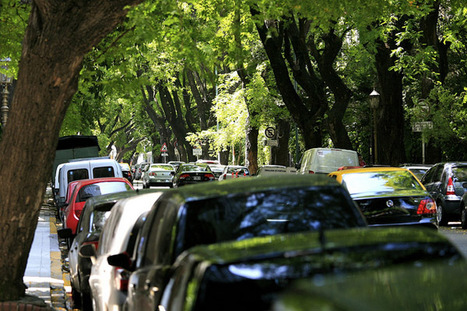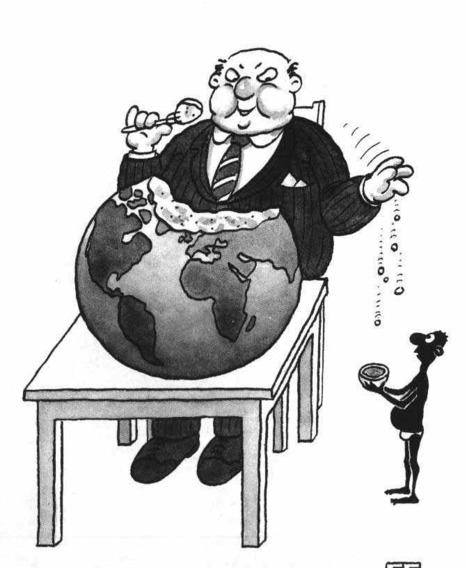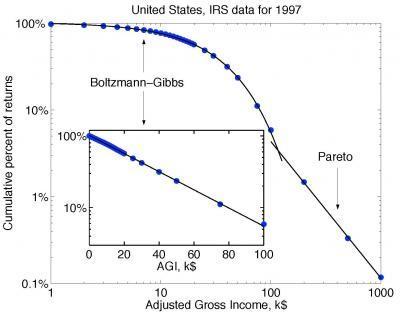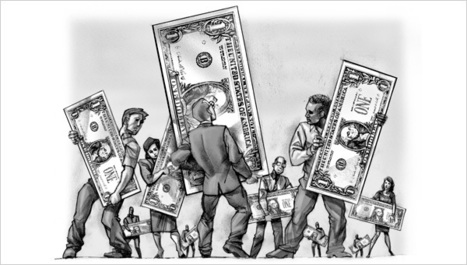 Your new post is loading...
 Your new post is loading...
Any process that spreads things (such as wealth) out in a more-or-less uniform way on a logarithmic scale will produce an approximate power law with a slope of -1. Note that progressive taxation in which the wealthy are taxed at a higher rate than the poor does not alter the power law, only making it grow more slowly from an initial distribution in which everyone has the same wealth. If the initial condition is something close to a power law, it will remain so in the presence of any reasonable taxation and redistribution of wealth. There will always be some segment of the population whose wealth consistently increases faster than another segment. Of course individuals can change where they lie on the curve through hard work, good money management, and luck.
Even the most democratic societies are rife with social and economic inequalities, as the current tension between the poorer "99%" and the richest "1%" vividly illustrates. But just how early in human events such social hierarchies became entrenched has been a matter of debate. A new study of skeletons from prehistoric farming communities across Europe suggests that hereditary inequality was an early feature, going back more than 7000 years ago. Most researchers agree that social hierarchies began with the advent of farming. The earliest known farming communities are found in the Near East, dating back almost 11,000 years. Archaeologists have looked for evidence of social stratification in these societies with mixed results. Some early farming societies show signs that people played different roles and that some were buried with greater ritual—shuffling off this mortal coil with a number of elaborate "grave goods," including pottery and stone tools. However, there is little evidence that social inequality was hereditary or rigidly defined. That seems to have changed sometime after farmers moved into Europe from the Near East, beginning about 8500 years ago during a period known as the European Neolithic. One of the best studied farming cultures is the Linearbandkeramik (LBK), which arose in what is today Hungary about 7500 years ago and spread as far as modern-day Paris within 500 years, after which it appears to have been superseded by other cultures.
Results demonstrate the existence of inequity aversion in children, provide a new method for studying inequity aversion specifically, and suggest the need for new models to explain why inequity aversion may have evolved.
How we went from medieval male marriages to executions to marriage equality.
A psychology professor's research indicates that public school teachers under-challenge minority students by providing them more positive feedback than they give to white students, for work of equal merit.
Himelboim found out that as the discussion group became larger, just like in offline life, they also became more hierarchical. People exhibit what’s called a preferential attachment toward those with many connections, which suggests that having many connections makes it easier to make more connections. For those having fewer connections, making new connections will be more difficult. Hence, the internet seems to foster inequality.
Smartphones are bridging a US digital divide as minorities tap into the Internet using mobile devices, according to a Pew study released on Friday. ...
According to a recent survey of two thousand women, a staggering 25 percent would rather win America’s Next Top Model than a Nobel Prize. Picking beauty over brains might be a bit shallow, but is it also a bad choice? In other words: is being attractive a blessing or a curse?
Though it is by no means a hard-and-fast rule, countries where gendered languages are spoken tend to have less equality for women.
Compelling new evidence of a link between inequality and crime in England invites reconsideration of the individualistic 'tough on crime' stances of recent New Labour and Conservative governments - according to an article in the latest issue of the journal Social Policy and Society.
"Evidence shows that most countries are making progress, but that few are managing to achieve inclusive and equitable progress," Richard and co-authors write. "Instead, most of the gains are taking place among the top socioeconomic quintiles, while the lower quintiles are seeing little or no progress." Poverty and the alleviation of its negative consequences are the main aim of the MDGs. Articles about ECONOMY http://www.scoop.it/t/science-news?tag=economy
Interestingly, participants tended to favor dispositional explanations over contextual explanations on average. That means our participants thought inequality was due to internal states, personal abilities, and individual actions (e.g., hard work, ability and talent) rather than external forces (e.g., inheritance, political influence, education opportunities). This result is not surprising, given that people in the USA tend to favor dispositional explanations more broadly--it's a product of our individualistic culture. What was interesting is that participants who came from families that they perceived to be wealthy and educated tended to favor these dispositional explanations more than their less wealthy/educated counterparts. Said another way, students from upper-class families tended to believe that economic inequality was a result of individual effort, ability, and talent, whereas their lower-class counterparts believed that the same inequality was due to external forces (e.g., political influence, educational opportunities).
|
“A group of researchers from several universities recently published a report on the attitudes and beliefs of employed men, which shows that those with wives who did not work outside the home or who worked part-time were more likely than those with wives who worked to: (1) have an unfavorable view about women in the workplace; (2) think workplaces run less smoothly with more women; (3) view workplaces with female leaders as less desirable; and (4) consider female candidates for promotion to be less qualified than comparable male colleagues.”
Hereditary inequality began over 7,000 years ago in the early Neolithic era, with new evidence showing that farmers buried with tools had access to better land than those buried without.
Wealthy cities seem to have it all. Expansive, well-manicured parks. Fine dining. Renowned orchestras and theaters. More trees. Wait, trees?
A new study provides the best evidence to date that higher levels of income inequality in the United States actually lead to more deaths in the country over a period of years.
Young adults who receive parental support are more likely to be studying and have access to better job opportunities than young people from disadvantaged backgrounds, according to a recent study by the Melbourne Institute of Applied Economic and Social Research.
Victor Yakovenko is an expert in statistical physics and studies how the flow of money and the distribution of incomes in American society resemble the flow of energy between molecules in a gas.
Articles about MATHEMATICS: http://www.scoop.it/t/science-news?tag=mathematics
While theories about race, gender, and math ability among high school students have long been debated, a recent study found that math teachers are in fact, unjustifiably biased toward their white male students.
College professors and students are in an arms race over cheating. Students find new sources for pre-written term papers; professors find new ways to check the texts they get for plagiarized material. But why are all these young people cheating? A new study published in Psychological Science, a journal of the Association for Psychological Science, suggests one reason: income inequality, which decreases the general trust people have toward each other.
Here’s a news flash that isn’t really new: the rich live longer than everyone else. Now, on the surface, this seems like a no-brainer. The ability to afford the best of everything should translate into better health while the inability to pay for even basic care, not to mention preventative medicine, is going to cut a person’s life short. For the threshold of the average human life span to surpass say 100 years, everyone should live like the rich do. The upper class has access to better resources, such as quality food and health care. They are also more informed, have the best education and have access to more opportunities. As a result, all of these factors collectively contribute to an improved quality of life. And if infomercials for juicers have taught us anything it’s that a better quality of life extends longevity.
But the proof is in the pudding…and that pudding better be full of statistics to back up this kind of claim.
Fortunately, studies have been going on for years to investigate the longevity gap.
Via Szabolcs Kósa
A new study finds that countries with more income inequality tend to have more people who believe that they are better than average — a psychological phenomenon known as “self-enhancement.”
Wired News (blog) "Longevity Will Be The New Inequality. The world's population will polarize in terms of life expectancy to the point where longevity will be the new inequality, according to Sarah Harper, a professor of gerontology at..."
Via Frederic Emam-Zade Gerardino
When the rich do something to deserve their riches, nobody complains. But when those at the bottom don't understand the unequal distribution of wealth, they get furious.
|

 Your new post is loading...
Your new post is loading...
 Your new post is loading...
Your new post is loading...



















